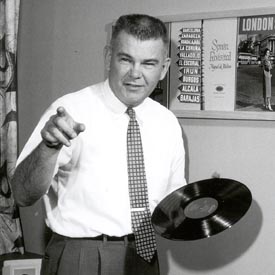David Edwin “Dave” Dexter Jr. (November 25, 1915 – April 19, 1990) was an American music journalist, record company executive, and producer known primarily for his long association with Capitol Records. He worked with many important figures in jazz and traditional popular music, including Count Basie, Peggy Lee, Duke Ellington, and Frank Sinatra. He is also known for his role in packaging and sometimes altering the recordings of The Beatles for the American market
Dexter was born and raised in Kansas City, Missouri. His career in music began in journalism, as he wrote about music for the Kansas City Journal-Post and then for Down Beat magazine in the late 1930s and early 1940s. During this time, he produced an album entitled Kansas City Jazz which documented his hometown’s jazz scene, showcasing such talents as Count Basie, Lester Young, and Big Joe Turner.[1]
In 1943, Dexter joined Capitol Records, established the previous year, initially writing press releases and doing other publicity work, but eventually rising to the position of A&R representative. Over the next three decades, he signed some of the biggest names in music to the label, including Frank Sinatra, Stan Kenton, Peggy Lee, Nat King Cole, Duke Ellington, Woody Herman and Kay Starr. He produced the first Dixieland recordings to reach the music charts, and was responsible for the landmark 1944 collection The History of Jazz.[3] He also compiled a series of world music albums, Capitol of the World, and served as editor of the company’s own publication, Capitol News. His productions included the Duke Ellington classic “Satin Doll“.
Dexter wanted the label to focus more on jazz than on rock and roll and hit singles. In a 1956 memo, he complained that the music business was being driven by the tastes of children, and derided current hits by such artists as Elvis Presley and Guy Mitchell as “juvenile and maddeningly repetitive.”
After 97% of Capitol stock was acquired by the British company EMI in 1955, Dexter was placed in charge of screening that company’s releases to determine if they were suitable for American release. He rejected most, and Capitol gave little promotional support to those records from EMI that were released. When The Beatles were initially signed to EMI’s Parlophone label and began to enjoy considerable success in Britain, Dexter turned down their initial four single releases, believing the group was not suitable for American audiences. In addition, no British pop group had previously had any noticeable, sustained success in the United States. He was finally persuaded to release “I Want To Hold Your Hand” – their fifth UK single – in late 1963.
In addition, Dexter rejected the following British EMI artists on behalf of Capitol in 1963 and 1964: Parlophone’s The Hollies and Billy J. Kramer and the Dakotas, HMV‘s The Swinging Blue Jeans and Manfred Mann, and Columbia‘s Gerry and the Pacemakers, The Animals, The Yardbirds, Herman’s Hermits and The Dave Clark Five, all of whom had major U.S. success on other labels beginning in 1964. In a memo dated Feb. 20, 1964 to Capitol Records head Alan W. Livingston, Dexter viewed most of these artists as unsuccessful, praising only Freddie and the Dreamers, whom he signed to Capitol.
Dexter oversaw The Beatles’ American releases from 1963 through 1966, compiling the albums according to his belief in the different needs of the American market, where albums tended to contain fewer songs than their UK counterparts, and where hit singles were routinely included on albums rather than being considered separate as was then common in the UK. Dexter also remixed some of the recordings, frequently adding reverb and altering the stereo picture. The resulting albums achieved great success, but have often been criticized over the years; critic Dave Marsh, for example, referred to Dexter’s treatment of the recordings as “genuine stupidity”. The Dexter-produced versions of the Beatles canon were released on CD in the form of the box sets The Capitol Albums, Volume 1 and The Capitol Albums, Volume 2.
Visit site: https://en.wikipedia.org/wiki/Dave_Dexter_Jr.



